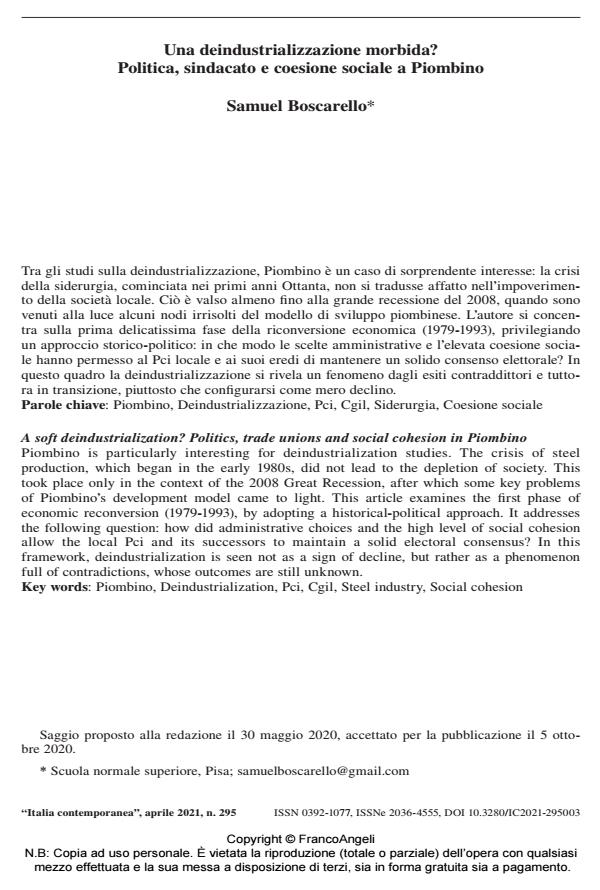A soft deindustrialization? Politics, trade unions and social cohesion in Piombino
Journal title ITALIA CONTEMPORANEA
Author/s Samuel Boscarello
Publishing Year 2021 Issue 2021/295
Language Italian Pages 29 P. 68-96 File size 228 KB
DOI 10.3280/IC2021-295003
DOI is like a bar code for intellectual property: to have more infomation
click here
Below, you can see the article first page
If you want to buy this article in PDF format, you can do it, following the instructions to buy download credits

FrancoAngeli is member of Publishers International Linking Association, Inc (PILA), a not-for-profit association which run the CrossRef service enabling links to and from online scholarly content.
Piombino is particularly interesting for deindustrialization studies. The crisis of steel production, which began in the early 1980s, did not lead to the depletion of society. This took place only in the context of the 2008 Great Recession, after which some key problems of Piombino’s development model came to light. This article examines the first phase of economic reconversion (1979-1993), by adopting a historical-political approach. It addresses the following question: how did administrative choices and the high level of social cohesion allow the local Pci and its successors to maintain a solid electoral consensus? In this framework, deindustrialization is seen not as a sign of decline, but rather as a phenomenon full of contradictions, whose outcomes are still unknown.
Keywords: Piombino, Deindustrialization, Pci, Cgil, Steel industry, Social cohesion
- Accetturo Antonio et al. (2015), Deindustrializzazione e terziarizzazione: trasformazioni strutturali nelle regioni del Nordovest, “Questioni di Economia e Finanza”, Banca d’Italia. Eurosistema, n. 282.
- Amatori Franco, Colli Andrea, Crepas Nicola (a cura di) (1999), Deindustrialization and Reindustrialization in 20th Century in Europe, Milano, Franco Angeli.
- Bagnasco Arnaldo, Berta Giuseppe, Pichierri Angelo (2020), Chi ha fermato Torino? Una metafora per l’Italia, Torino, Einaudi.
- Balconi Margherita (1991), La siderurgia italiana (1945-1990). Tra controllo pubblico e incentivi del mercato, Bologna, Il Mulino.
- Bartolini Francesco (2015), La Terza Italia. Reinventare la nazione alla fine del Novecento, Roma, Carocci.
- Bell Daniel (1973), The Coming of Post-Industrial Society, New York, Basic Books.
- Berta Giuseppe (2013), L'Italia delle fabbriche. La parabola dell'industrialismo italiano nel Novecento, Bologna, Il Mulino.
- Berta Giuseppe, Pichierri Angelo (a cura di) (2007), Libro bianco per il nord ovest. Dall'economia della manifattura all'economia della conoscenza, Venezia, Marsilio.
- Blackaby Frank (a cura di) (1978). De-industrialization, Londra, Heinemann-NIESR.
- Bluestone Barry, Harrison Bennett (1982), The Deindustrialization of America. Plant Closings, Community Abandonment, and the Dismantling of Basic Industry, New York, Basic Books.
- Caruso Valerio, Corona Gabriella (2019), La deindustrializzazione in Italia: uno sguardo d’insieme, “Clionet. Per un senso del tempo e dei luoghi”, n. 3, www.rivista.clionet.it.
- Cowie Jefferson (1999), Capital Moves. RCA’s Seventy-Year Quest for Cheap Labor, Ithaca, Cornell University Press.
- Crouch Colin et al. (a cura di) (2004). Changing Governance of Local Economies, Oxford, Oxford University Press.
- Corona Gabriella (2016), Volti e risvolti della deindustrializzazione. Alcuni interrogativi sulla contemporaneità, “Meridiana”, n. 85, pp. 9-34. DOI: 10.1400/242832
- Favilli Paolo (1974), Capitalismo e classe operaia a Piombino. 1861-1918, Roma, Editori Riuniti.
- Garruccio Roberta (2016), Chiedi alla ruggine. Studi e storiografia della deindustrializzazione, “Meridiana”, n. 85, pp. 35-60. DOI: 10.1400/242833
- High Steven (2003), Industrial Sunset: The Making of North America’s Rust Belt, 1969-1984, Toronto, University of Toronto Press.
- High Steven (2013), “The Wounds of Class”: A Historiographical Reflection on the Study of Deindustrialization, 1973-2013, “History Compass”, Vol. 11, n. 11, pp. 994-1007.
- Kideckel David A. (2008), Getting By in Postsocialist Romania. Labor, the Body and Working-Class Culture, Bloomington, Indiana University Press.
- Laxer Robert (a cura di) (1973), Canada Ltd. The Political Economy of Dependency, Toronto, McClelland&Stewart.
- Martin Ron, Rowthown Bob (a cura di) (1986), The Geography of De-industrialisation, Londra, MacMillan.
- Mény Yves, Wright Vincent, Rhodes Martin (a cura di) (1987), The Politics of steel: Western Europe and the steel industry in the crisis years (1974-1984), Berlino-New York, de Gruyter.
- Portelli Alessandro (2010), They Say in Harlan County. An Oral History, New York, Oxford University Press.
- Portelli Alessandro (2017), La città dell’acciaio. Due secoli di storia operaia, Roma, Donzelli.
- Romeo Salvatore (2019), L’acciaio in fumo. L’Ilva di Taranto dal 1945 ad oggi, Roma, Donzelli.
- Russolillo, Franco (a cura di) (2015), Storia dell’IRI. Un gruppo singolare. Settori, bilanci, presenza nell’economia, vol. V, Roma-Bari, Laterza.
- Silva Francesco (a cura di) (2013), Storia dell’IRI. I difficili anni ‘70 e il tentativo di rilancio degli anni ‘80, Vol. III, Roma-Bari, Laterza.
- Sonetti Catia (1979-1980), Ricostruzione e comportamento operaio a Piombino (1944-1953), Università degli Studi di Pisa.
- Taft Chloe E. (2018), Deindustrialization and the Postindustrial City, 1950-Present, “American History”.
- Tognarini Ivan (1997), La Proletaria: una cooperativa di lavoratori dalle origini al grande balzo: 1945-1971, Napoli, Edizioni Scientifiche Italiane.
- Tognarini Ivan, Panicucci Massimo (1999), La battaglia di Piombino, Napoli, Edizioni Scientifiche Italiane.
- Tomlinson Jim (2016), De-industrialization Not Decline: A New Meta-narrative for Post-war British History, “Twentieth Century British History”, Vol. 27, n. 1, pp. 76-99.
- Tomlinson Jim (2019), De-industrialization: strenghts and weaknesses as a key concept for understanding post-war British history, “Urban History”, pp. 1-21. DOI: 10.1017/S0963926819000221
- Tonarelli Annalisa (2016), Piombino: il lento declino di una città industriale, “Meridiana”, n. 85, pp. 81-108. DOI: 10.1400/242835
- Tonarelli Annalisa (2015), Trasformazioni dell'esperienza operaia, tra regolazione formale e informale. Il caso della siderurgia a Piombino, “Sociologia del lavoro”, n. 139. DOI: 10.3280/SL2015-139006
- Vergallo Luigi (2011), Una nuova era? “Deindustrializzazione” e nuovi assetti produttivi nel mondo (1945-2005), Roma, Aracne.
Samuel Boscarello, Una deindustrializzazione morbida? Politica, sindacato e coesione sociale a Piombino in "ITALIA CONTEMPORANEA" 295/2021, pp 68-96, DOI: 10.3280/IC2021-295003